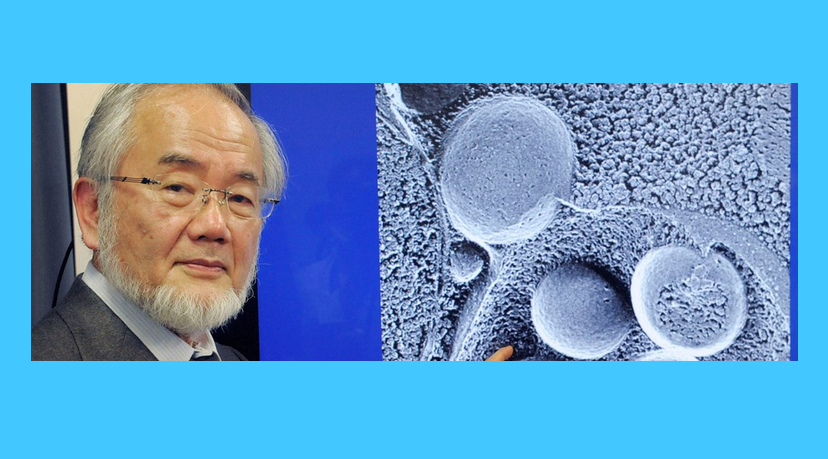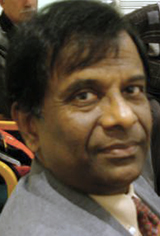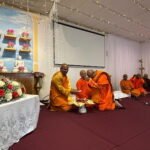
Certain Faith Traditions and Modern Science – Lionel Bopage
- Sujeewa Senerath
- October 24, 2025
- Health & Social Welfare, Political
- lionel bopage
- 0 Comments
In 2016, Japanese cell biologist, Yoshinori Ohsumi was awarded the Nobel Prize in Medicine for discovering mechanisms for autophagy. He was a professor at the Institute of Science, Institute of Innovative Research in Tokyo. This discovery in the field of medicine pertains to the micro-level mechanisms that the body employs to decompose and recycle its cellular components. Autophagy involves cells breaking down and recycling damaged components. It is a natural process that transforms faulty cell parts of the body into energy when the body is starved, and helps promote cellular repair, health, and regeneration.
I am not a health professional. However, the research I have done, and my practice and experience during the last few years have convinced me of the health benefits of fasting, specifically of intermittent fasting. Certain forms of fasting would cause a process of autophagy. It can help prevent neurodegenerative disorders by removing toxic protein buildups, which are associated with Alzheimer’s and Parkinson’s diseases (Mizushima N and Komatsu M 2011, Autophagy: Renovation of Cells and Tissues, 147 (4), 728-741). It reduces the risk of cancer by eliminating damaged or precancerous cells (Kroemer G and Levine B 2009, Autophagic cell death: the story of a misnomer; In Nature Reviews Molecular Cell Biology 9(12), 1004-10). By improving insulin sensitivity, this procedure also lowers the risk of type 2 diabetes and improves metabolic health (Longo V D and Mattson M P 2014, Fasting: molecular mechanisms and clinical applications, In Cell Metabolism, 19(2), 181-92). Additionally, intermittent fasting is linked to anti-inflammatory effects, as it mitigates chronic inflammation, which is advantageous for conditions such as arthritis and autoimmune diseases (de Cabo R and Mattson M 2019, Effects of Intermittent Fasting on Health, Aging, and Disease; In New England Journal of Medicine, 381, 2541-2551).
Autophagy appears to be analogous with the modern-day process of utilising waste matter to generate energy. It is a natural process that occurs when the body does not get enough food. During this process, the body’s defective components are eliminated and converted into energy. Recycling damaged parts encourages cellular regeneration, health, and repair. Thus, it plays a crucial role in preventing premature aging and various degenerative diseases such as cancer and Alzheimer’s.
When I fell ill about four years ago, I started reading about this process. I still find this subject very fascinating. I had a hard time convincing many people, though, that this natural method was better than getting used to injecting and taking pills. This, in my opinion, is mostly because of how hectic their daily work and personal schedules are.
Fasting has been a core practice in various religious traditions. It aligns with the goals of purification and cleansing found in many religious practices such as those of Buddhism, Islam, Hinduism, Christianity, and Judaism. Autophagy is a physiological response to fasting. Both spiritual disciplines and scientific evidence show that fasting of sufficient duration (around 12-16 hours) would trigger this process.
While I was studying Buddhism at the Dhamma school in Sri Jinendraramaya, Weligama, I learned that Buddha told his followers to fast every day as a routine. He had instructed his disciples to only have breakfast and lunch but skip dinner. He also had asked to practice slow walking (සක්මන්) daily, particularly during the early hours. I wonder whether many of the disciples adhere to such practices nowadays. This process is analogous to the current practice of intermittent fasting for 18 hours, almost daily allowing the body to initiate the process of autophagy. I take a different approach, forgoing breakfast and keeping an eating window open for lunch and dinner, typically from 12:00 pm to 6:00 pm.
I have read about the Hindu practices such as “Upavasam” (for example, religious fasts like Ekadasi – fasting one day a fortnight), Ayurvedic and Siddha medical principles (for example, Agni – the concept of internal “fire of digestion”), ancient yoga recommendations, Satvik diet (a simple, plant-based diet that is low in processed foods and toxins), use of warming spices like ginger and black pepper (can aid digestion), meditation (dhyana) and reduction of stress (that induces inflammation and inhibits autophagy). Such practices can promote the process of autophagy through natural detoxification and cellular cleansing. According to Ayurvedic principles, aligning with natural circadian rhythms such as early rising, eating before sunset can enhance autophagy. These practices align with the modern scientific understanding that fasting, a simplified diet, and reduced stress would help repair damaged cells and regenerate new, healthier cells, by triggering the process of autophagy. Certain herbs like ashwagandha and triphala, and treatments like Panchakarma (which includes fasting), are also said to support autophagy. A lifestyle pursuing minimalism and simplicity (Sanyasa) may indirectly support cellular health by reducing mental stress.
For Muslims, fasting is not simply about health. It is also a matter of religious principle and self-discipline. Muslims usually fast from dawn to sunset (mostly more than twelve hours) during the holy month of Ramadan. Primarily they perform it as a spiritual discipline. Such a process would naturally lead to autophagy. They believe fasting during Ramadan offers both spiritual purification and physical healing, reinforcing the wisdom of their religious teachings.
Fasting is also a practice commonly found in Christianity. It aligns with the goals of purification and spiritual strength found in their traditions. This spiritual practice is seen as a way to achieve physical and spiritual health. Jewish fasting practices, like those on Yom Kippur is considered as a central procedure for atonement and spiritual renewal. Yom Kippur refers to a 25-hour fast on the holiest day of the year. Jewish law prioritises health and forbids fasting if it endangers life. The practice of fasting itself is understood to have health benefits.
This discovery of autophagy by Yoshinori Ohsumi, gives fasting a scientific dimension and shows how it helps cells grow back and improves people’s health in general. Even though religious practices are primarily defined and interpreted as divine commands, ongoing research shows that they have been scientifically validated as beneficial to people’s health and well-being.

20 October 2025
![]()

